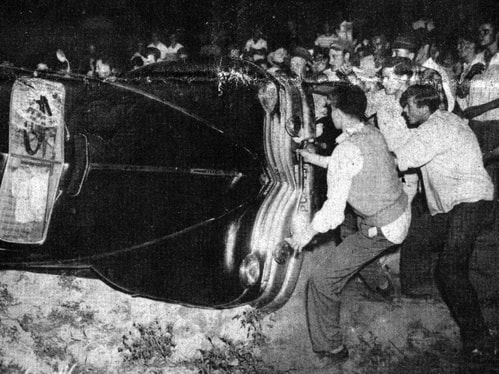|
In 1947 my mother and I attended a concert in Peekskill, NY where Paul Robeson sang in an outdoor setting. We were seated in the back on grass and I couldn’t see so I stood up. Suddenly there was a deep voice saying, “Folks, there’s a little girl with blonde pigtails standing up in the back. Would you mind if she came up front so she can see better?” The next thing I knew, waves of people were lifting me up and over until I was in the front, face to face with Paul Robeson, a tall handsome Black singer with a broad chest sitting on a high stool. He beckoned me to come up, sat me on his lap, and asked what song I’d like him to sing. The audience yelled, “Old Man River.” He asked if I’d like to hear that song. I was too dumbstruck to do more than nod. He sang as I rested against his huge chest, lulled by the power of his voice and the safety of his presence. Two years later, in 1949, although I was now 13, I wasn’t much taller and still had blond pigtails. Secretly, I was hoping Mr. Robeson would see me, invite me to sit on his lap, and sing a song for me. As we approached the concert area there were police everywhere, blocking any possibility of entering. My mother showed a policeman our tickets but we were told, “The concert is cancelled. Go home before there’s trouble.” My mother refused to accept what he said and challenged him: What kind of trouble?” He ignored her words. With his body movement, he made it impossible for us to do anything but turn around and go back to the parking lot. At the time, we didn’t know that there had been so many threats of violence the promoters decided to cancel the concert. I was disappointed and shocked. Why would someone want to hurt such a marvelous singer as Paul Robeson?
About two weeks later, my parents heard that Paul Robeson and performers like Pete Seeger would be singing at a concert in a picnic grounds about seven miles from our place in the country, near Peekskill. Many members of the community decided to go—even those who didn’t care about the performers’ politics—they just loved to listen to Paul Robeson. Since there had been so much talk of violence, World War II vets and union members were recruited to guard the area. I got dressed to go but my mother said I had to stay and babysit my sister. I was furious. Just because they decided she was too young to go, I had to stay home and take care of her. Before leaving they told me they expected to be home around seven at the latest. Seven came and went. Even though it was still early I had a funny feeling in my stomach, like something was terribly wrong. My sister said she was hungry so I made her favorite supper—a hamburger with lettuce and tomato. I couldn’t eat. I was too worried. Eight and nine o’clock came and went. I told her our parents probably went out for dinner and put her to bed. I knew something bad had happened. Around midnight our parents arrived, unscathed, too upset to hide their feelings, but not ready to talk. I learned what happened the next morning. There were seven entryways to the picnic grounds. People drove in and parked. The concert was held with vets and union members surrounding the concert area in a protective circle. But after the concert ended, all but one of the entryways had been blocked off. Drivers were forced to use this exit only. Hoodlums threw rocks and bottles at drivers, overturned cars, tossed fireballs, screamed at passengers—all while police stood by—some with smiles on their faces, doing nothing. Stopping nothing. No local hospitals would accept the injured who had to drive about 20 miles to Ardsley-on-Hudson before they could get medical help. My piano teacher’s wife lost an eye. My parents survived safely because my father knew the area well. When he heard the commotion and saw the entryways blocked off, he drove into an area hidden by trees and waited until he thought it was safe to drive home. Since a member of the community had not come home my father and two other men went to look for him. He’d been hit in the head by a stone and was lying in a ditch, barely conscious. My father, a certified first aid specialist, treated him and insisted the hospital admit him, lying about the cause of the injury. The newspapers reported that communist agitators had rioted, causing all the casualties and property damage. Even though there were photos showing police standing by, watching the violence, no one was held accountable. I was indignant. Outraged. I knew very well the concertgoers had not incited violence. The violence was done to them, not by them. How could the papers call people like my parents and my piano teacher and his wife, and me, if I’d been allowed to go, perpetrators, agitators, commies, troublemakers? I asked my father, “How can the papers lie?” “Welcome to the world, Nancy.” Paul Robeson later said, “The only time I feared for my life was not in Nazi Germany in 1939, but in Peekskill, NY, in 1949. Have you ever experienced reading about people being unjustly accused? What was this like for you?
1 Comment
Marlene Simon
11/1/2021 10:33:53 am
Another amazing story. We are now learning how these kinds of events have been going on for decades, no, centuries, and not much has been written about it, or worse, suppressed. Thanks again for sharing this with us. It is again, so heartbreaking and tragic. I think it does give a perspective to what has been taking place these last few years and now, because of technology, there is no hiding the reality of what a violent culture we live in.
Reply
Leave a Reply. |
Monthly StoriesStories inspired by world tales to challenge and comfort. Archives
July 2024
Categories |
Copyright © Nancy King 2020 | Site Design by Angulo Marketing & Design
|
|
Nancy King is a widely published author and a professor emerita at the University of Delaware, where she has taught theater, drama, playwriting, creative writing, and multidisciplinary studies with an emphasis on world literature. She has published seven previous works of nonfiction and five novels. Her new memoir, Breaking the Silence, explores the power of stories in healing from trauma and abuse. Her career has emphasized the use of her own experience in being silenced to encourage students to find their voices and to express their thoughts, feelings, and experiences with authenticity, as a way to add meaning to their lives.
|


 RSS Feed
RSS Feed